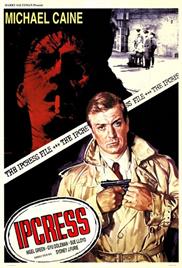Be Careful of Fake Websites. Always use HindiMovies.to domain & Join our Telegram Channel for Latest Updates.

Likes: 3
Views: 2.65K
A number of leading Western scientists have been kidnapped only to reappear a fews days later. Unfortunately, each scientist has been brainwashed and is now completely useless. The British send their agent, Harry Palmer, to investigate. Palmer is surprised to be selected for such a mission (considering his past) and believes he has been chosen because he is expendable.
Duration: 109 min
Released: 1965
IMDb Rating: 7.4/10 (8,183 Votes)
Genre: Crime, Dubbed Movies, Mystery, Thriller
Stars: Michael Caine, Nigel Green, Guy Doleman, Sue Lloyd
Directors: Sidney J Furie
Writers: W.H. Canaway, James Doran
Year: 1965
Server 1 – Nowvideo
Server 2 – Videoweed
The Ipcress File (1965): An Intriguing Dive into Espionage and Deception
Introduction
Released in 1965, The Ipcress File remains a seminal work in the espionage thriller genre, setting itself apart with a unique style and a gripping narrative. This British crime thriller weaves a tale of Cold War intrigue that is equal parts mysterious and thrilling, expertly capturing the paranoia and clandestine operations that defined the period. Based on Len Deighton's novel of the same name, the film is an excellent representation of 1960s spy cinema, balancing suspense, drama, and sharp characterization.
Plot Synopsis: What Is This Movie About?
The Ipcress File follows the story of Harry Palmer, a British intelligence officer who is reluctantly pulled back into the espionage world to investigate the strange disappearance of scientists involved in secret government projects. The plot thickens when Palmer is tasked to uncover the truth behind a mind-controlling brainwashing technique used by unknown adversaries to compromise British intelligence. Throughout the film, audiences witness a gritty, grounded portrayal of spy work, marked by bureaucratic red tape, psychological manipulation, and moral ambiguity.
The story unfolds with Harry Palmer navigating a labyrinth of deception, carefully peeling back layers of conspiracy. The movie’s tone contrasts sharply with the more glamorous and gadget-filled spy films of its era, lending the narrative a sense of realism and tension. The menace is subtle but pervasive, and the mysterious "Ipcress File" itself serves as a key to unlocking the conspiracy at the heart of the narrative.
Main Actors and Crew
Direction and Writing
The movie is skillfully directed by Sidney J. Furie, whose vision brought a moody, almost noir aesthetic to the espionage genre. Furie's direction emphasizes a bleak and often claustrophobic environment that enhances the film’s suspense and tone.
The screenplay was crafted by James Doran, James Mitchell, and Harold Pinter. Notably, Harold Pinter, a celebrated playwright and screenwriter renowned for his mastery of dialogue and subtext, infused the script with layers of complexity and tension. Their collective writing captures the morally ambiguous and paranoid world of intelligence operations, making the storyline as intellectually stimulating as it is thrilling.
Unique Qualities and Cinematic Style
Unlike its contemporaries, The Ipcress File eschews flashy gadgets and grandiose action sequences in favor of a more understated and cerebral approach. The film’s use of innovative cinematography, particularly in its incorporation of unusual camera angles and color filters, contributes to a distinct visual style that enhances the narrative’s enigmatic quality.
Michael Caine's portrayal brought a revolutionary down-to-earth depiction of a spy, contrasting with the suave and gentlemanly spies popularized by the James Bond series. This grounded approach to espionage, along with the film’s exploration of bureaucratic malaise and psychological tactics of brainwashing, made it resonate with audiences and critics alike.
Legacy and Impact
The success of The Ipcress File not only boosted Michael Caine’s career but also inspired a series of sequels and solidified the Harry Palmer character as a unique alternative to the glamorized spy figures of the 1960s. Its influence can be seen in the way spy films later approached character development, story complexity, and visual style.
Furthermore, the film’s innovative depiction of espionage, highlighting paranoia and psychological intrigue over physical action, paved the way for more realistic and nuanced spy dramas in cinema and television.
Conclusion
The Ipcress File stands as a classic spy thriller that continues to captivate audiences with its intelligent narrative, memorable performances, and stylistic innovations. Michael Caine’s portrayal of Harry Palmer delivers a compelling character study, while Sidney J. Furie’s direction and Harold Pinter’s writing provide a richly textured exploration of Cold War espionage. For fans of crime, mystery, and thriller genres, this 1965 film remains an essential, influential work that offers much more than just a typical spy story.